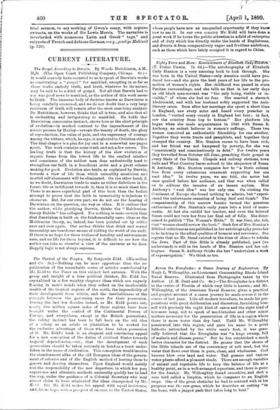CURRENT LITERATURE.
The Gospel According to Darwin. By Woods Hutchinson, A.M., M.D. (The Open Court Publishing Company, Chicago. 63.)— It would scarcely have occurred to us to speak of Darwin's works as constituting a "gospel " for mankind, excepting in so far as those works embody truth, and truth, whatever be its nature, may be said to be a kind of gospel. Not all that Darwin had to sly was good news to mankind, as the author of this work seems to think. Tho immense body of doctrine known as Darwinism is being carefully examined, and we do not doubt that a very large residuum of truth will remain after the most searching analysis. Dr. Hutchinson, however, thinks that all is true, and also that all is enchanting and invigorating to mankind. He holds that Darwinism consecrates instinct, shows love as the chief principle of evolution—in marked contrast to the impeachment of the cosmic process by Huxley—reveals the beauty of death, the glory of reproduction, the value of pain, and the supremacy of courage among the virtues, which, he says, is neglected in Christian ethics. The final chapter is a plea for joy cast in a somewhat neo-pagan spirit. The work contains some truth and not a few errors. The leading truth is that the history of the slow evolution of organic forms from the lowest life to the exalted intellect and conscience of the noblest man does undoubtedly tend to strengthen our faith in a beneficent order and a great scheme making for good. Evolution also tends, as explained by Darwin, towards a view of life from which unhealthy asceticism and morbid self-abasement will be eliminated. On the other hand, if, as we doubt, Darwinism tends to make us either disbelieve in the future life or indifferent towards it, then it is so much sheer loss. There is no more superficial part of this book than the foolish attempt to prove that the faith in immortality is injurious to character. But, for our own part, we do not see the bearing of Darwinism on the question, one way or other. It is curious that the author, while glorifying Darwin, thinks the " Malthusian- theory Bubble " has collapsed. For nothing is more certain than that Darwinism is built on the fundamentally same ideas as the Malthusian theory, as, indeed, has been pointed out by critics over and over again. Our author thinks that drink and sexual immorality are beneficent means of ridding the world of the unfit. If there is no hope for these victims of heredity and environment here, and no life for them beyond, it is difficult to see how the author can take so cheerful a view of the universe as he does. Happily logic is not always supreme.






































 Previous page
Previous page